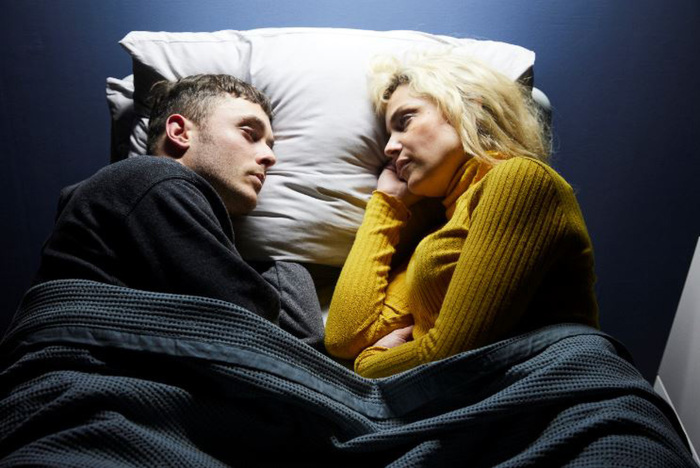Giulietta Masina in Cinecitta of the 1950s, a Frankenstein feminist who does not compromise on freedom, even sexual freedom, a generous woman who curses herself for the happiness of others: the third day of the Venice Film Festival is all female. The second of six Italian films in the competition: Dawn at Last by Saverio Costanzo with Rebecca Antonachi and Creature Povere! Yorgos Lanthimos with Emma Stone and in Orizzonti additionally Michaela Ramazzotti’s directorial debut, Felicità. And also the melodrama Bastarden with Mads Mikkelsen for the Venice 80 competition, and Wes Anderson, awarded for his career, out of competition brings a 40-minute short film “The Wonderful Story of Henry Sugar” from the stories of Roald Dahl with (absent) Ralph Fiennes, Benedict Cumberbatch , Dev Patel, Ben Kingsley. Finally, the dawn of Saverio Costanzo, set in Hollywood on the banks of the Tiber, the golden age of Americans in “Cinecitta” with blockbuster Basques, crosses the real case of 1953 with Wilma Montesi, an aspiring actress found raped dead on Capocotta beach, with a history very young Mimosa (Rebecca Antonachi), dreaming of cinema with her eyes open, becomes the common favorite of the diva Lily James (a kind of Liz Taylor in Cleopatra) and, equally naive, crosses the streets of the film set and cinema. simply with courage. “I thought about Giulietta Mazina, about her unconventional femininity, about her frankness,” says Saverio Costanzo, who dedicated the film to his father Maurizio, in theaters from December 01 to 14 – for Mimosa.
The charm of the cinema, the wonder of the scenery, Liz Taylor and Richard Burton, the chariots and pyramids restored in Cinecitta, the dream of Bellissima and Fellini, but also “the archetypal image of a woman who was used and thrown away, this body on Wilma Montesi’s Capocotta beach, the loss of innocence” : Says Saverio Costanzo. A €28 million blockbuster, an unusual budget for an Italian opera and an international cast with Lily James and Willem Dafoe (absent due to a strike), a young Antonachi, Alba Rohrwacher as Alida Valli and again Sofia Panizzi. and a cameo in drag queen Michelle Bravy. “Mimosa,” Saverio Costanzo emphasizes in an interview with ANSA, “looks at the naive world, with sincerity, not chasing the cunning, insight that society always offers us today, to do it at any cost, no matter what, perhaps trampling on others. The invitation that Mimosa makes to the viewer who has managed to be reflected in her is to muster up the courage of her own simplicity, innocence, believe in it and try to remain so. In the epilogue, she realizes her strength, but that doesn’t mean she adapts.”
This is a hymn to freedom. Poor creatures! Greek Lanthimos (in cinemas with Disney since January 25), who, due to the strike, deprived Venice of the magnificent heroine Emma Stone, who is also a producer here. Bella Baxter is a sort of benevolent monster, a being born out of the reckless operation of Dr. God (Willem Dafoe), a pure being, just like Mimosa from Finally Dawn, who is slowly becoming aware of her femininity, walking the path of self-determination and sexual liberation.
Based on the Scottish writer Alasdai Gray’s novel Poor Deeds, the film, with reconstruction and attention to noteworthy detail, reunites Lanthimos and Stone after The Favorite and presents the viewer with a visual and intellectual adventure of an “uptight” woman in the Victorian era, able to deserve emancipation scientific rationality and pure feelings.
Finally, Desiree, the protagonist of Micaela Ramazzotti’s Happiness in Orizzonti Extra, is a generous and kind woman who finds the courage to challenge the toxic family she grew up in. “I dreamed about this film even at night, in my imagination there was a story of a dysfunctional family, I knew exactly which path victims and perpetrators should take, between two kind souls and their parents,” says Michaela Ramazzotti.
Shot between the Rome of radical chic to the left of Piazza Vittorio and the dorms on the outskirts of Fiumicino, with a cast comparing the much older professor Sergio Rubini to Desire-Ramazotti, who is an on-set hairdresser’s assistant by profession and whom he would like to “teach” , therefore, “change” her family, Mazzoni, her father Max Tortora, a showman on private television, her mother Anna Galiena, a housewife, and her son Claudio (Matteo Olivetti), who suffers from mental problems, also due to the use of sedatives. life and sad that they make him do. The engine is Desire, who is ashamed of his parents, but at the same time helps them, who helps his brother, who curses himself at the cost of everything and in the end manages to cure all this fragility and save him. “I have a weakness for fragile people, for weaknesses, for mental discomfort, for people born crooked and inferior,” says Ramazzotti, avoiding personal mention.
Reproduction is copyright © Copyright ANSA

